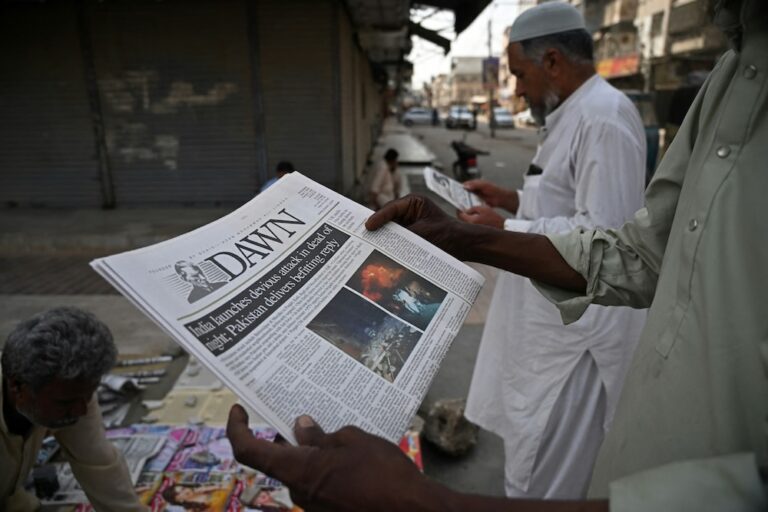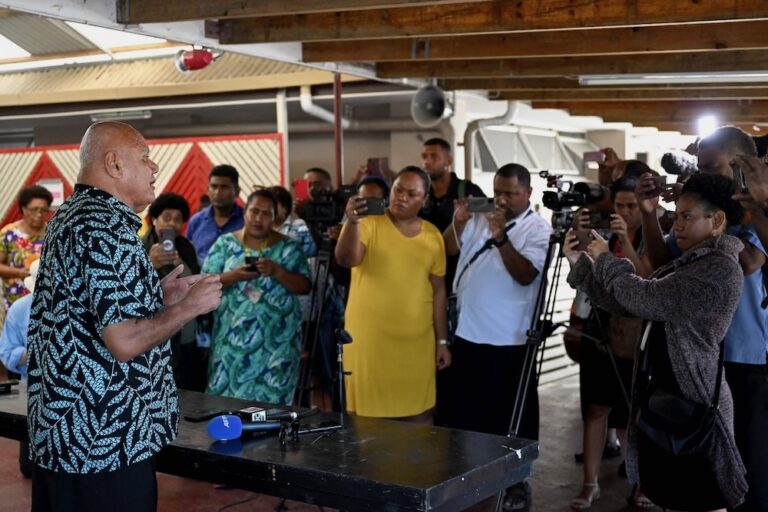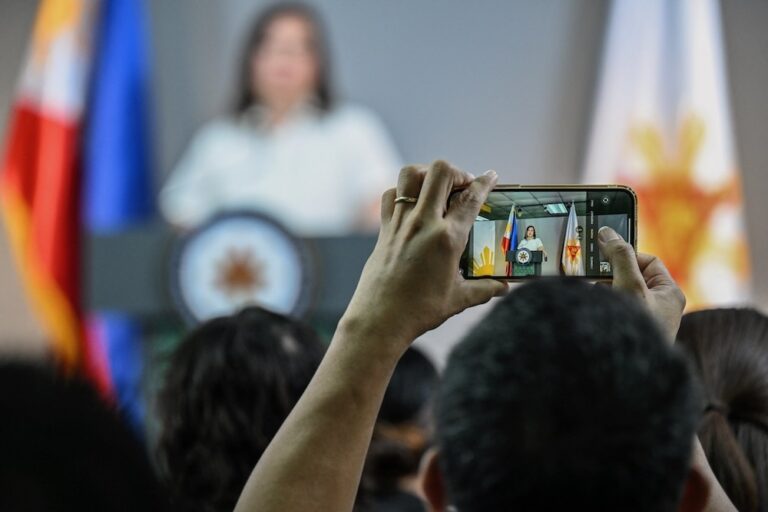September 2022 in Asia-Pacific: A free expression round up produced by IFEX's regional editor Mong Palatino, based on IFEX member reports and news from the region.
Widespread atrocities in Xinjiang confirmed in UN report, Hong Kong’s press freedom index continues to slide, Martial Law’s negative impact on media freedom and democracy in the Philippines endures, and the devastating floods that displaced millions in Pakistan underscore the need for global climate action and the protection of public access to life-saving information.
UN report alleges crimes against humanity in Xinjiang
Outgoing UN High Commissioner for Human Rights Michelle Bachelet ended her term by releasing her office’s assessment of human rights concerns in the Xinjiang Uyghur Autonomous Region (XUAR) in China. The report concluded that “serious human rights violations have been committed in XUAR in the context of the Government’s application of counter-terrorism and counter-“extremism” strategies.” It added that the violations may amount to crimes against humanity:
“The extent of arbitrary and discriminatory detention of members of Uyghur and other predominantly Muslim groups, pursuant to law and policy, in context of restrictions and deprivation more generally of fundamental rights enjoyed individually and collectively, may constitute international crimes, in particular crimes against humanity.”
The report also notes the “patterns of intimidations and threats against members of the diaspora community speaking publicly about experiences in XUAR.”
Human Rights Watch (HRW) says the report should be formally presented to the Human Rights Council as it “lays a solid foundation for further UN and Human Rights Council action towards accountability in China.”
Hong Kong press freedom index sinks lower
The Hong Kong Journalists Association (HKJA) released its latest press freedom index, which shows a sharp decline over the past year, based on a survey among Hong Kong journalists and the public. The low rating is attributed to the “decreasing diversity in viewpoints carried by local media outlets” especially after the forced closure of independent media outlets Apple Daily and Stand News. HKJA warns that the continuing slide of freedom of expression could undermine the territory’s status as an international financial hub:
“Hong Kong’s business environment would become less attractive to those seeking opportunities at an international financial hub if there is no longer free flow of information, and if its press freedom is compromised. Ensuring that the press could operate in a free and safe environment will be crucial to maintaining Hong Kong’s status as an international financial centre, while allowing journalists to contribute to the growth of a vibrant society.”
The release of the HKJA survey was done a few weeks after its chair, Ronson Chan, was briefly detained by the police and charged with obstruction while covering a local event. His case is an illustration of the tensions between police and the local media community.
Meanwhile, five speech therapists were convicted of sedition for publishing children’s books illustrating the 2019 mass protests. Amnesty International described the conviction as an “absurd example of the disintegration of human rights in the city.”
Civil and political rights violations in Mongolia
Globe International Center released its two-year monitoring report of journalists’ safety and civil and political rights violations in Mongolia. It shows how authorities have routinely violated people’s access to information, right to association, and right to peaceful assembly. A recent example of state persecution is the case of prominent human rights defender Sukhgerel Dugersuren, who faces an investigation for alleged collusion with foreign agents. She has been consistently advocating for the rights of communities that are resisting destructive projects. Among those who expressed support with Sukhgerel was UN Special Rapporteur on Human Rights Defenders Mary Lawlor.
Good news
In South Korea, the Constitutional Court ruled that the failure to notify individuals of the sharing of their data was a due process violation. ARTICLE 19, which submitted a brief on the Telecommunications Business Act, welcomed the ruling and urged the Court to consider their other recommendations, such as requiring a court warrant before authorities can obtain personal data. “Imposing mandatory notification should lead to greater transparency of government surveillance and ultimately improve the protection of freedom of expression and the right to privacy,” ARTICLE 19 said in a statement.
In Nepal, IFEX member Freedom Forum welcomed the ruling of the Janakpurdham High Court, which sentenced suspended lawmaker and former Minister of State to life imprisonment for the 2010 murder of Arun Singhaniya, who was then the chairman of Janakpur Today Media Group. The group says the verdict “could contribute to reducing impunity for crimes against journalists” in the country.
In the Philippines, the Komisyon sa Wikang Filipino [Commission on Filipino Languages] reversed its earlier memorandum ordering the pull-out of five books it deems “subversive”. A legislator noted that this “would not have been done if not for the clamor of the people and strong condemnation of the people against attacks on academic freedom, freedom of the press, and free speech.”
In India, journalist Siddique Kappan was granted bail by the Supreme Court. He was arrested in 2020 while traveling to Uttar Pradesh to cover a gang-rape case. He was charged with sedition, rioting, and criminal conspiracy, as well as under the Unlawful Activities Prevention Act and Information Technology Act. It’s not all good news though; despite the Court order, the police said Kappan will remain in jail because of a pending probe by the Enforcement Directorate.
Martial Law’s anniversary and media repression in the Philippines
Various groups marked the 50th anniversary of the Martial Law declaration in the Philippines by highlighting the media repression that took place the year it was invoked, and the systematic crackdown on freedom of expression under the government of President Rodrigo Duterte, whose term ended in June this year. Duterte was replaced by Ferdinand Marcos Jr., the son and namesake of the late dictator who had imposed Martial Law.
IFEX member the Center for Media Freedom and Responsibility describes the similarity in tactics that have been adopted by Marcos and Duterte to undermine press and manipulate public opinion:
- Propaganda through government agencies and social media
- ABS-CBN shutdown (the country’s biggest media broadcaster)
- Attacks and threats against journalists
- Crony press, media selectivity
- Myth-making movies
Myanmar in brief: The latest updates
- Freelance journalist Htet Htet Khine was sentenced to three years in prison with hard labor after a court convicted her on charges of inciting hatred and violence against the armed forces in her reporting. She received another three-year prison sentence for being part of a banned media network and for “harboring” a journalist wanted by authorities. Htet Htet Khine, who has been in detention since August 2021, worked for BBC Media Action as a presenter from 2016 to 2020. Media groups, including BBC, have expressed alarm over her sentencing.
- Independent media organizations in Myanmar criticized the junta representation at the recent Dili Dialogue Forum in Timor-Leste. The junta-backed speaker on behalf of the Myanmar Press Council blamed the independent media for allegedly spreading disinformation about the country’s political situation, and deliberately ignored the suppression of media and the jailing of journalists since the 2021 coup.
- A landmark petition was filed in Jakarta asking Indonesia’s Constitutional Court to permit a case against the Myanmar junta for committing war crimes and genocide against the Rohingya Muslim population. It’s the first universal jurisdiction case against the junta in a member state of the Association of Southeast Asian Nations.
- Digital Rights Monitor featured how the military authorities are using social media and messaging platforms like Facebook and Telegram to spread hate speech against religious minorities in the country. Pro-junta groups also target critics and human rights defenders by sharing their personal information in these platforms. Tech companies have been called out to address the misuse and abuse of their platforms.
Pakistan’s flood, women’s health care, and the importance of internet access during crises
A devastating flood has affected 30 million people in Pakistan, underscoring the need for urgent global climate action. Human Rights Watch is concerned about the impact of the disaster on women’s health care and has appealed for the delivery of reproductive health services in flood-affected towns.
Ensuring the free flow of information is essential in providing timely assistance to communities. Nighat Dad and Shmyla Khan of IFEX member Digital Rights Foundation have written about about the grave consequences of internet shutdowns during crisis moments.
“As the country grapples with the possibility of regular climate-induced disasters and an upcoming general election fraught with deep political fissures, it is worth asking whether we are comfortable with the prospect of internet shutdowns compounding future crises.”



